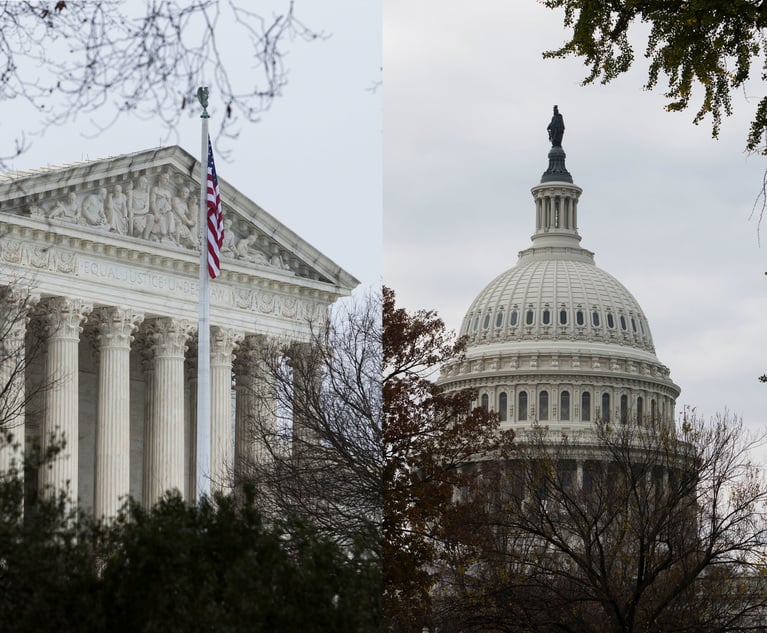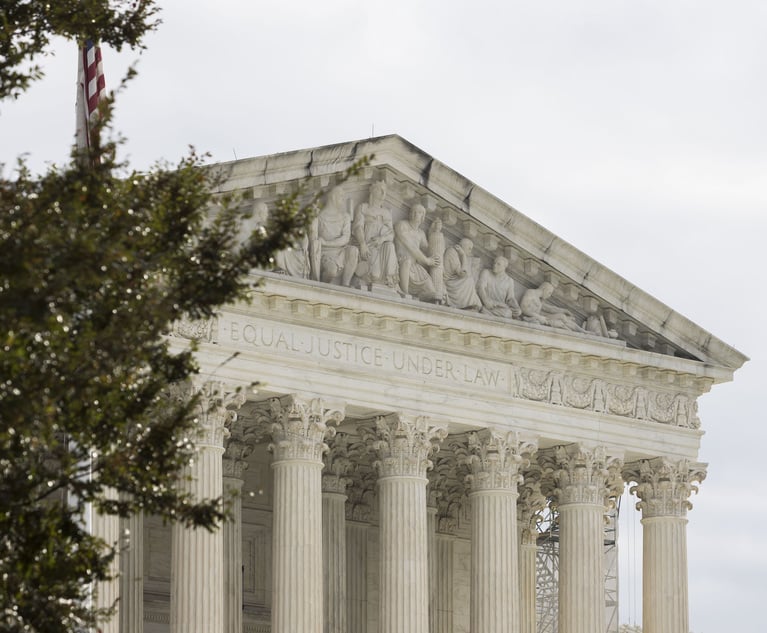 Donald J. Kochan, of George Mason University's Antonin Scalia Law School. Courtesy photo
Donald J. Kochan, of George Mason University's Antonin Scalia Law School. Courtesy photoLingering Questions at Supreme Court About Climate Change Litigation Need Resolution
This global problem must be addressed at the federal level and handled through legislation and the regulations implementing it, not the courts.
November 13, 2024 at 09:00 AM
6 minute read
In the past several years, frustrated with the political process, climate change activists have been turning their resources to litigation. With the new election results at the federal level, that resource commitment is likely to become even more pronounced.
Bouncing around these climate cases are questions whether courts are an appropriate venue for heated and complex debates about science and policy or whether this policy-driven litigation is an assault on the traditional role of courts asking them to exceed and pervert their traditional moorings.
Increasingly, courts are holding the latter true. And the U.S. Supreme Court has before it two opportunities to weigh in to decide the same, and rein in these cases before they spiral beyond control.
In an original complaint filed directly to the Supreme Court, as state governments may do when suing other states, 19 Republican attorneys general led by the attorney general of Alabama sued California and several other states with Democratic governors. The complaint in Alabama v. California argues that the Democratic states should be enjoined from suing oil companies over emissions and promotion of fossil fuels because, among other things, these state court actions are a de facto regulation of the U.S. and global energy sectors, harming the plaintiff states and interfering with exclusive federal powers.
That case is still pending before the Supreme Court. Indeed, on Oct. 7 the court released an order stating that “The solicitor general [of the United States] is invited to file a brief in this case expressing the views of the United States.”
Also before the nation’s highest court is whether to grant petitions for certiorari to review a decision from the Hawaii Supreme Court that recognized a broad theory of liability to hold energy companies liable for the effects of climate change.
These petitions for certiorari in Sunoco LP v. City and County of Honolulu and Shell PLC v. City and County of Honolulu were filed by the defendants in February. The City and County of Honolulu plaintiffs submitted their reply asking the Supreme Court not to hear the case on May 1.
Like the October request in the state attorneys general case, on June 10, the U.S. Supreme Court put its decision whether to grant the petitions in the Honolulu cases off and asked the solicitor general of the United States to weigh in with her legal view of the cases. We are still awaiting the solicitor general’s briefs in both cases.
In the Honolulu cases, the Hawaii Supreme Court rejected the defendants’ motion to dismiss where they contended that federal law displaces or preempts these kinds of lawsuits.
The defendants had correctly explained that a comprehensive federal regulatory scheme such as implemented under the Clean Air Act should preempt myriad, sometimes conflicting state laws addressing the same and related issues, lest the federal priorities and balancing of interests be compromised. These issues include energy policy and sensitive decisions about geopolitical issues of climate change requiring complex decisionmaking exclusively within the purview of Congress and federal policymaking authorities.
Since the June request for the solicitor general's view in the Honolulu cases, there have been important jurisprudential developments that make granting cert even more important.
For example, the Circuit Court for Baltimore City resoundingly dismissed the city of Baltimore’s climate change litigation against oil companies. That court’s July 10 opinion held that “global pollution-based complaints were never intended by Congress to be handled by individual states” and “the Supreme Court of the United States has held that state law cannot be used to resolve claims seeking redress for injuries caused by out of state pollution (sources).” The court also noted that the consumer protection and deception claims could not stand because “the explanation by Baltimore that it only seeks to address and hold Defendants accountable for a deceptive misinformation campaign is simply a way to get [emissions control] in the back door what they cannot get in the front door.” Furthermore, “Maryland state courts have yet to extend public nuisance law to cases concerning production, promotion and sale of consumer products.”
Indeed, the Baltimore case relied upon several federal and state decisions that had already gone the same way. And these cases too create a split with the Hawaii Supreme Court at the time the petition was filed earlier this year. Such splits are among the principal justifications the U.S. Supreme Court uses to consider granting a cert petition.
Among these cases is the April 2021 decision from the U.S. Court of Appeals for the Second Circuit in City of New York v. Chevron. There, the federal appeals court rejected the availability of state tort law in the climate change context. It explained that “global warming presents a uniquely international problem of national concern. It is therefore not well-suited to the application of state law.” Besides the Second Circuit, other courts have recently applied the "AEP rationale" to the new wave of climate change cases in direct conflict with the Hawaii Supreme Court, including a Delaware trial court in January 2024.
These courts’ conclusions flow, in part, from the U.S. Supreme Court’s 2011 decision in AEP v. Connecticut holding that the Clean Air Act displaces the federal common law in this climate change context. The AEP Court left open the question whether the Clean Air Act also preempted state law. But, such a holding would be a logical extension of the AEP court’s reasoning.
And, granting the petitions in the Honolulu cases would give the court a chance to expressly fill what some see as a gap left open by its necessarily incomplete reasoning in its 2011 decision. Similarly, the Alabama v. California case is another vehicle for expressing the same limits. State courts simply should not be allowed to play policymakers in the climate change space.
This global problem must be addressed at the federal level and handled through legislation and the regulations implementing it, not the courts. The U.S. Supreme Court should use the cases before it as a way to clarify this allocation of power and responsibility. That is the way to direct our resources effectively to deal with climate priorities. Trampling through the courts with these arguments is simply dangerous and disruptive to finding real solutions.
Donald J. Kochan is professor of law and executive director of the Law & Economics Center at George Mason University’s Antonin Scalia Law School.
NOT FOR REPRINT
© 2025 ALM Global, LLC, All Rights Reserved. Request academic re-use from www.copyright.com. All other uses, submit a request to [email protected]. For more information visit Asset & Logo Licensing.
You Might Like
View All
Roberts Calls Court's Relationship With Congress 'Strained.' Who's to Blame?

Judicial Conference Declines Democratic Request to Refer Justice Thomas to DOJ

Chief Justice Roberts Ends Year With Defense Against 'Illegitimate' Attacks on Judiciary

Trending Stories
- 1Restoring Trust in the Courts Starts in New York
- 2'Pull Back the Curtain': Ex-NFL Players Seek Discovery in Lawsuit Over League's Disability Plan
- 3Tensions Run High at Final Hearing Before Manhattan Congestion Pricing Takes Effect
- 4Improper Removal to Fed. Court Leads to $100K Bill for Blue Cross Blue Shield
- 5Michael Halpern, Beloved Key West Attorney, Dies at 72
Who Got The Work
Michael G. Bongiorno, Andrew Scott Dulberg and Elizabeth E. Driscoll from Wilmer Cutler Pickering Hale and Dorr have stepped in to represent Symbotic Inc., an A.I.-enabled technology platform that focuses on increasing supply chain efficiency, and other defendants in a pending shareholder derivative lawsuit. The case, filed Oct. 2 in Massachusetts District Court by the Brown Law Firm on behalf of Stephen Austen, accuses certain officers and directors of misleading investors in regard to Symbotic's potential for margin growth by failing to disclose that the company was not equipped to timely deploy its systems or manage expenses through project delays. The case, assigned to U.S. District Judge Nathaniel M. Gorton, is 1:24-cv-12522, Austen v. Cohen et al.
Who Got The Work
Edmund Polubinski and Marie Killmond of Davis Polk & Wardwell have entered appearances for data platform software development company MongoDB and other defendants in a pending shareholder derivative lawsuit. The action, filed Oct. 7 in New York Southern District Court by the Brown Law Firm, accuses the company's directors and/or officers of falsely expressing confidence in the company’s restructuring of its sales incentive plan and downplaying the severity of decreases in its upfront commitments. The case is 1:24-cv-07594, Roy v. Ittycheria et al.
Who Got The Work
Amy O. Bruchs and Kurt F. Ellison of Michael Best & Friedrich have entered appearances for Epic Systems Corp. in a pending employment discrimination lawsuit. The suit was filed Sept. 7 in Wisconsin Western District Court by Levine Eisberner LLC and Siri & Glimstad on behalf of a project manager who claims that he was wrongfully terminated after applying for a religious exemption to the defendant's COVID-19 vaccine mandate. The case, assigned to U.S. Magistrate Judge Anita Marie Boor, is 3:24-cv-00630, Secker, Nathan v. Epic Systems Corporation.
Who Got The Work
David X. Sullivan, Thomas J. Finn and Gregory A. Hall from McCarter & English have entered appearances for Sunrun Installation Services in a pending civil rights lawsuit. The complaint was filed Sept. 4 in Connecticut District Court by attorney Robert M. Berke on behalf of former employee George Edward Steins, who was arrested and charged with employing an unregistered home improvement salesperson. The complaint alleges that had Sunrun informed the Connecticut Department of Consumer Protection that the plaintiff's employment had ended in 2017 and that he no longer held Sunrun's home improvement contractor license, he would not have been hit with charges, which were dismissed in May 2024. The case, assigned to U.S. District Judge Jeffrey A. Meyer, is 3:24-cv-01423, Steins v. Sunrun, Inc. et al.
Who Got The Work
Greenberg Traurig shareholder Joshua L. Raskin has entered an appearance for boohoo.com UK Ltd. in a pending patent infringement lawsuit. The suit, filed Sept. 3 in Texas Eastern District Court by Rozier Hardt McDonough on behalf of Alto Dynamics, asserts five patents related to an online shopping platform. The case, assigned to U.S. District Judge Rodney Gilstrap, is 2:24-cv-00719, Alto Dynamics, LLC v. boohoo.com UK Limited.
Featured Firms
Law Offices of Gary Martin Hays & Associates, P.C.
(470) 294-1674
Law Offices of Mark E. Salomone
(857) 444-6468
Smith & Hassler
(713) 739-1250










